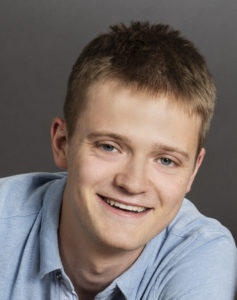10 out of 200: Of math, memory, and marathon – Bastian Wiederhold is on the fast track
Jens-Steffen Scherer
Meet Bastian Wiederhold, mathematician and one of this year’s 10 out of 200 young researchers participating in the 7th Heidelberg Laureate Forum from September 22nd – 27th, 2019.

What are your name and nationality?
My name is Bastian Wiederhold and I am from Stuttgart, Germany.
Where did you study and where are you currently based?
Recently, I completed a B.Sc. Mathematics at the University of Stuttgart. In October, I will start as a graduate student at the University of Oxford.
What is the focus of your research? What is your research project?
I am passionate about statistics and probability. The general question of how to formularize a not determined process into a theoretical structure intrigues me. In my bachelor’s thesis, I focused on reproducing kernel Hilbert spaces and hope to do research in this and related fields in the coming years.
Why do you want to become a mathematician?
I have always been interested in many subjects such as physics, chemistry, cosmology, economics or architecture. Sooner or later, I came across mathematics in nearly all of these areas. Thus, when I was still in school, I decided to become a junior student in mathematics at Stuttgart University. Right from the start I was fascinated by the creativity and elegance of mathematical proofs and enjoyed mathematics ever since. I want to become a mathematician for those two reasons: to describe and solve problems elegantly and generically and to learn the language humans use to explore the world from a rational perspective.
What are some of the fundamental challenges you have faced in your academic career?
Completing my B.Sc. in two years instead of three was hard sometimes. When I finished school, I already had some knowledge of university mathematics from my studies as a junior student. In the beginning, I was still recommended to graduate in standard three years. After one year I realized that I was too fast for three years: either I would have to finish in two years and apply for a master’s degree immediately or slow down my pace. I chose the first option and was happy to get an offer from the University of Oxford. However, this resulted in the next challenge: the semesters in England are time-shifted and I had to finish a thesis which needed a month to be examined. So, I even had to finish another two months earlier! In the end, I managed to master this challenge and finished a three-year degree in under two years.
What do you feel are the greatest pressures facing scientists today?
There are some topics like climate change or immigration where the public debates are not decided by arguments but rather by feelings. The side with the more vociferous and mightier supporters gets more public attention and independent research is less considered. If decisions are no longer based on rational arguments and what is best for most people, this is a dangerous development for scientists and the whole society.
What are you doing besides research?
I always loved to acquire knowledge and started to deal with memory techniques. Over the years I become a memory athlete placed in the top 50 worldwide, e.g. I memorized a 380-digit-number in 5 minutes. Other interests of mine include marathon running and juggling.
How did you hear about the HLF and why did you apply?
I remember reading a newspaper article about the HLF when I was in school. From then on, I knew that I would apply one day. The HLF is a great opportunity to learn more about mathematics, to get new ideas in which areas to specialize and to learn from experienced scientists what steps to take in life to be able to research in a facilitating environment. Furthermore, I love meeting outstanding people from all over the world.
What do you expect from this meeting?
I hope to get new ideas in which fields of mathematics I would like to do research. Of course, I am looking forward to meeting people I can collaborate with. In any case, I expect the HLF to be an enjoyable week full of inspiring conversations with leading and future leading scientists.
Which laureates present at the forum would you really like to talk to and what do you want to ask them?
I am very much looking forward to talking with laureates who deal with probability, stochastics, machine learning… However, I expect great conversations with all the laureates and will use the opportunities that arise.
Who were your most important mentors and what lessons did they pass on to you?
My parents always supported me and taught me to believe that almost anything is possible if you are willing to train.
Felix Dörre and Jan Rapp introduced me to programming and higher mathematics when I was in school. In a way, meeting them was the beginning of my path to mathematics.
In 2016 you participated in the World Schools Debating Championships. How do you benefit from your communication skills as a mathematician?
In general, mathematics has a lot more to do with communication than people might think at first: every proof is about conveying ideas in neat ways and many mathematical works are the results of collaborations. Every mathematician knows the feeling of being stuck on a problem and solving it by talking to a friend or supervisor, simply because they can give a different perspective.
Expressing ideas in a structured and eloquent way makes it easier for other mathematicians to follow your ideas and is precisely what you train in debating. No matter if you collaborate for exercises or research, it helps to be good at making new friends and work as a team.
Der Beitrag 10 out of 200: Of math, memory, and marathon – Bastian Wiederhold is on the fast track erschien zuerst auf Heidelberg Laureate Forum.